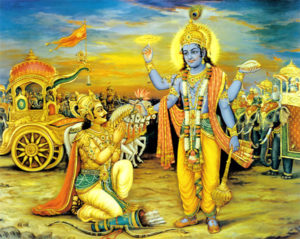 The observance of Gita Jayanti is a constant reminder to all mankind, regardless of creed or race, of the need to intensify one’s efforts at performing actions that will lead to freedom from bondage. Such advice was espoused by Shri Krishna throughout the Bhagavad Gita as He urged Arjuna to yield not to inaction but to perform his dharma and to do so dispassionately and selflessly. Today, five thousand years later, with the quickening pace of an evolving dynamic world, of changing lifestyles, standards, norms and relationships, such a message is needed more than ever.
The observance of Gita Jayanti is a constant reminder to all mankind, regardless of creed or race, of the need to intensify one’s efforts at performing actions that will lead to freedom from bondage. Such advice was espoused by Shri Krishna throughout the Bhagavad Gita as He urged Arjuna to yield not to inaction but to perform his dharma and to do so dispassionately and selflessly. Today, five thousand years later, with the quickening pace of an evolving dynamic world, of changing lifestyles, standards, norms and relationships, such a message is needed more than ever.
It is instructive to note that the very first syllable in the Bhagavad Gita is “dhar” and the last, found at the end of Chapter 18, is “ma”. From the combination of these two syllables, the word “dharma” is obtained, which encompasses the entire text of the Gita. Loosely translated, dharma refers to duty, which essentially, is the innermost constitution by which an individual lives. As members of society we assume various roles at different points in time, with varying responsibilities and interactions. We also acquire and practise particular ethical and moral values. As such, the sum total of all these comprises our dharma.
We are assured that our actions are dharmic as long as they are done selflessly, without material desires, without the need for securing a return of fruits, without some material or personal motive, mental or self-gratification.
Dharma performed conscientiously, and without attachment, leads to the ultimate goal of self-realisation, says Bhagavan Krishna in Chapter Three, verse 19 of Gita. On the other hand, failure to act according to these guidelines results in “daihik taap” (bodily discomforts), “bhautik taap” (environmental disturbances) and “daivik taap” (natural disasters).
A close examination of our environment, the workplace, houses of worship, schools, home, even our very own lives, physical and otherwise, holds up a mirror to our collective actions. Quite often we find ourselves in roles of either victim or offender of the gross collapse in discipline and lawlessness that pervade our land. Corruption in several strata of society, dereliction of duty and disrepect for human life has become the order of the day. Dollars come before duty. Empathy towards our fellowman has become a rare virtue. So, too, are acts of charity in this global village, despite the many high-tech innovations that have broken barriers of distance and communication. Subsumed in the pursuit of materialism, there has been a definite swerve from the path of dharma.
On this auspicious occasion of Gita Jayanti which will be celebrated on December 10, 2016, SWAHA implores all to ensure that the pillars of Sanatan Dharma of satyam (truth), soucham (cleanliness), dayaa (compassion) and daan (charity) remain firmly cemented on the ground of sacrifice, firmness and fearlessness and plastered by right action. To this end, the daily reading of Bhagavad Gita is recommended. By performing this Rishi yagya, we will enrich our lives. Indeed, this instrument of the Gita should help to draw up the blueprint for the attainment of self-realisation. It is worthwhile to note that what we are is Bhagavan’s gift to us. What we make of ourselves is our gift to Bhagavan. May Shri Krishna fill our lives with the ecstasy that comes from dharma.
Paramacharya Pt. Hardeo Persad
Spiritual Head
SWAHA


